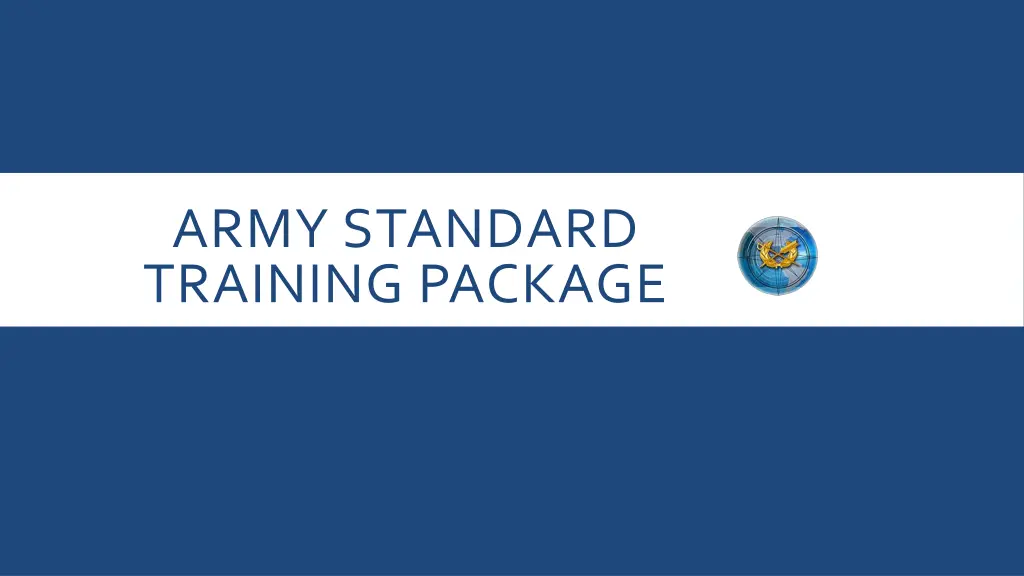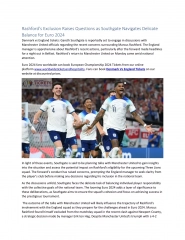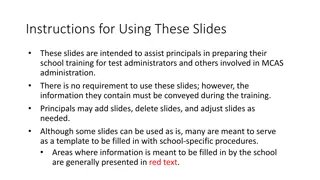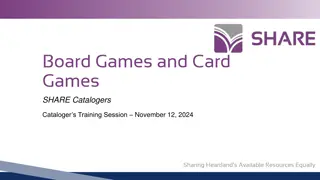
Understanding Military Policy on Improper Relationships and Fraternization
Learn about the Army Standard Training Package focusing on Improper Senior-Subordinate Relationships and Fraternization, including training objectives, references, history of current policy, and Secretary of Defense's findings. Explore the DoD guidance and the impact of sex-related offenses on military commanders.
Download Presentation

Please find below an Image/Link to download the presentation.
The content on the website is provided AS IS for your information and personal use only. It may not be sold, licensed, or shared on other websites without obtaining consent from the author. If you encounter any issues during the download, it is possible that the publisher has removed the file from their server.
You are allowed to download the files provided on this website for personal or commercial use, subject to the condition that they are used lawfully. All files are the property of their respective owners.
The content on the website is provided AS IS for your information and personal use only. It may not be sold, licensed, or shared on other websites without obtaining consent from the author.
E N D
Presentation Transcript
ARMY STANDARD TRAINING PACKAGE
Improper Senior-Subordinate Relationships and Fraternization (ISSRFRAT)
ISSRFRAT TRAINING OBJECTIVES References Policy and History Status Based Rules Effects Based Analysis Commander s Response Judge Advocate s Role Current as of 26 February 2020
REFERENCES AR 600-32 (18 December 2023) DoDI1304.33 (January 28, 2015) DA PAM 600-35 Article 92, Failure to Obey General Order or Regulation Article 93, Cruelty and Maltreatment Article 93a, Prohibited Activities Article 133, Conduct Unbecoming an Officer Article 134, Fraternization Current as of 26 February 2020 Current as of November 2024
HISTORY OF CURRENT POLICY Defense Secretary William S. Cohen appoints task force June 1997. Task force examines each service s Good Order and Discipline offenses. Task force finds disparate treatment between services treatment of fraternization. Current as of 26 February 2020 Current as of November 2024
SECRETARY OF DEFENSES FINDINGS [T]he Services defined, regulated, and responded to relationships between service members differently. Such differences in treatment are antithetical to good order and discipline, and are corrosive to morale, particularly so as we move towards an increasingly joint environment. Defense Secretary William S. Cohen, 29 Jul 98 Current as of 26 February 2020 Current as of November 2024
THE DOD GUIDANCE Service Secretaries will, by policy, prohibit personal relationships such as dating, sharing living accommodations, engaging in intimate or sexual relations, business enterprises, commercial solicitations, gambling and borrowing between officer and enlisted regardless of their Service. Defense Secretary William S. Cohen, 29 Jul 98 Current as of 26 February 2020 Current as of November 2024
SEX-RELATED OFFENSES MAJOR REASON BEHIND COMMANDER DISMISSALS - 20 JAN 2013 (AP) At least 30 percent of military commanders fired over the past eight years lost their jobs because of sexually related offenses, including harassment, adultery, and improper relationships. . . Gen. Martin Dempsey . . . conclude[d] that while training is adequate, it may need to start earlier in service members' careers and be reinforced more frequently. Current as of 26 February 2020 Current as of November 2024
PURPOSE Limiting the potential for actual or perceived abuse of authority or partiality is a primary purpose of the policy on relationships. Maintain good order, morale, and discipline Special confidence and trust placed in officers and NCOs AR 600-32, para. 2-1 Current as of 26 February 2020 Current as of November 2024
PURPOSE Unit cohesion is hampered anytime relationships between the unit s members compromise the chain of command. If Soldiers believe that the chain of command is partial, unfair, uses rank for personal gain, or is exploitive or coercive in nature, discipline breaks down and cohesion is destroyed. Damage to the unit occurs when the chain of command is com-promised and even when Soldiers simply believe it has been compromised. Real or imagined, the unit and the Army pay the price when relationships between its Soldiers are, or are perceived to be, unprofessional. DA PAM 600-35 Current as of 26 February 2020 Current as of November 2024
ARMY POLICY ANALYSIS: Question 1: Is the relationship in a strictly prohibited category? Question 2: Are there adverse effects? (Actual, predictable, or perceived). If NO to questions 1 and 2, relationship does not violate the policy. Current as of 26 February 2020 Current as of November 2024
ARMY POLICY ANALYSIS: Applies across service lines Applies to USAR and ARNG Gender-neutral Beyond romantic associations Current as of 26 February 2020 Current as of November 2024
APPLICABILITY Article 92, UCMJ Current as of 26 February 2020 Current as of November 2024
APPLICABILITY Rule is punitive. All Soldiers bear responsibility for compliance. However: Senior member in the best position to limit relationship Punishments may differ Current as of 26 February 2020 Current as of November 2024
PART I STATUS BASED RULES Current as of 26 February 2020 Current as of November 2024
OFFICER/ENLISTED RELATIONSHIPS Prohibited: On-going business relationship Personal relationships Gambling Current as of 26 February 2020 Current as of November 2024
NCO/JUNIOR ENLISTED RELATIONSHIPS Prohibited: On-going business relationship Personal relationships Gambling Current as of 26 February 2020 Current as of November 2024
ONGOING BUSINESS RELATIONSHIPS Loaning or borrowing money, commercial solicitation, or joint business venture. Current as of 26 February 2020 Current as of November 2024
ONGOING BUSINESS RELATIONSHIPS Exceptions: Landlord/tenant relationships One time transactions (house or car sale) For ARNG/USAR only: Business relationships which exist due to civilian occupation Current as of 26 February 2020 Current as of November 2024
PERSONAL RELATIONSHIPS Dating, shared living accommodations, and intimate or sexual relationships between officer and enlisted or NCOs and junior enlisted Soldiers are prohibited. One Year Grace Period: Soldier with a change in status from enlisted to officer or junior enlisted to noncommisioned officer has a one year grace period to marry or end the relationship. Current as of 26 February 2020 Current as of November 2024
PERSONAL RELATIONSHIPS Exceptions: Promotion or change in status of one member. (One year grace period) NG/USAR: Primarily civilian acquaintance, if not in AD status (other than AT) Marriage (Command can still action on fraternization prior to marriage) Current as of 26 February 2020 Current as of November 2024
GAMBLING PROHIBITED: Gambling between officers and enlisted personnel; and NCOs and junior enlisted Soldiers BUT: It s not gambling if nothing at stake Office pool for bragging rights Charitable or other community functions Current as of 26 February 2020 Current as of November 2024
ENTRY-LEVEL TRAINING Trainee: Any military or civilian member undergoing initial military training in a formal training course with a unique training course identifier or in an in-residence or education course Trainer: Any military or civilian member who is responsible for planning, organizing, or conducting initial military training Status extends 6 months after completion of entry-level training Generally, if not required by training mission, then relationship is prohibited Current as of 26 February 2020 Current as of November 2024
RECRUITING Recruit: Prospects, applicants, Delayed Entry/Training Programs Prospect: 1 year from date they express loss of interest to recruiting personnel Generally, if not required by the recruiting mission, then relationship is prohibited Current as of 26 February 2020 Current as of November 2024
PROHIBITED CONDUCT AR 600-32, para 3-1a.(1)(a) Current as of 26 February 2020 Current as of November 2024
PROHIBITED CONDUCT CAN NOT: use grade/position, threats, pressure, or promise of favorable treatment to gain sexual favors make sexual advances enter recruiter/trainer home unless authorized share the same living area be in recruiter/trainer POV unless safety risk provide alcohol attend social gatherings on a personal social basis hire/employ participate in closed-door discussions Current as of 26 February 2020 Current as of November 2024
APPROVAL AUTHORITY FOR EXCEPTIONS Recruiter/Trainer/Trainee O4 commander (or higher) can approve exceptions for pre-existing relationships Request must be in writing Documented on DD Form 2982 Current as of 26 February 2020 Current as of November 2024
MANDATORY INITIATION OF SEPARATION AR 600-32, para. 3-2a Substantiated violations of actions identified in paragraph 3 1b(1) by an Army recruiter or Army trainer providing entry-level training will require the Soldier to be processed for administrative separation from the Army, unless the Soldier is otherwise punitively discharged or dismissed from the Army for the violation as part of a court-martial sentence. Current as of 26 February 2020 Current as of November 2024
ARTICLE 93A: PROHIBITED ACTIVITIES WITH MILITARY RECRUIT OR TRAINEE BY PERSON IN POSITION OF SPECIAL TRUST Two offenses 1. 2. Abuse of Training Leadership Position Abuse of Position as Military Recruiter Victim: specially protected junior member of the armed forces Awaiting basic training, cadet, OCS student, etc. AND any other program identified by Secretary as for initial career qualification Crime: prohibited sexual activity = sexual act or sexual contact or any attempt or solicitation. (AR 27-10, para. 29-2) Consent not a defense Current as of 26 February 2020 Current as of November 2024
PART II EFFECTS BASED RULES Current as of 26 February 2020 Current as of November 2024
5 ADVERSE EFFECTS (RELATIONSHIPS AMONG DIFFERENT RANKS) Compromise, or appear to compromise the integrity of authority Cause actual/perceived partiality or unfairness Involve/appear to involve improper use of rank Are, or perceived to be, exploitative or coercive Cause actual/predictable adverse impact on discipline, authority morale, or mission accomplishment Current as of 26 February 2020 Current as of November 2024
RULES CAVEAT Policy prohibitions are not intended to preclude normal team-building associations, such as: Community organizations Religious activities Unit social functions Athletic teams Family gatherings Current as of 26 February 2020 Current as of November 2024
PART III COMMANDER S RESPONSE Wide Range of Responses Counseling/training administrative non-judicial punishment court-martial Goal is to use level that is warranted, appropriate, and fair Current as of 26 February 2020 Current as of November 2024
COMMANDERS SHOULD: Consult with legal advisor Use common sense Focus on parties positions Is there direct command or supervisory authority? Can one party influence personnel/disciplinary actions of the other? Leaders are responsible for setting the right command climate and providing guidelines for outside the classroom mentoring and team-building activities. Current as of 26 February 2020 Current as of November 2024
COMMANDERS ROLE Prevention through: Training Leadership Coaching and mentoring Be Proactive: Policy Memos OPDs/Commander s Call Current as of 26 February 2020 Current as of November 2024
CHARGING OPTIONS Fraternization (Art 134) Failure to Obey General Order or Reg. AR 600-32 (Art 92) Associated Offenses: Cruelty and Maltreatment (Art 93) Prohibited Activities with Recruit or Trainee by Person in Position of Special Trust (NEW Art 93a) Conduct Unbecoming an Officer (Art 133) Extramarital Sexual Conduct (Art 134) Current as of 26 February 2020 Current as of November 2024
JAS ROLE Represent the Command: Advise Investigating Officer Perform legal review of completed investigations Provide policy advice and sanity check to commanders Perform training Prosecute cases Represent the Soldier: Provide legal assistance to Soldier involved Defend case Current as of 26 February 2020 Current as of November 2024






















